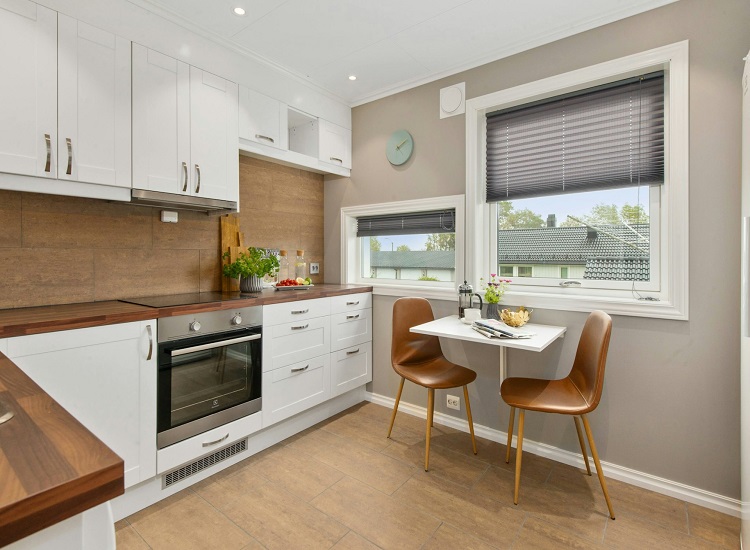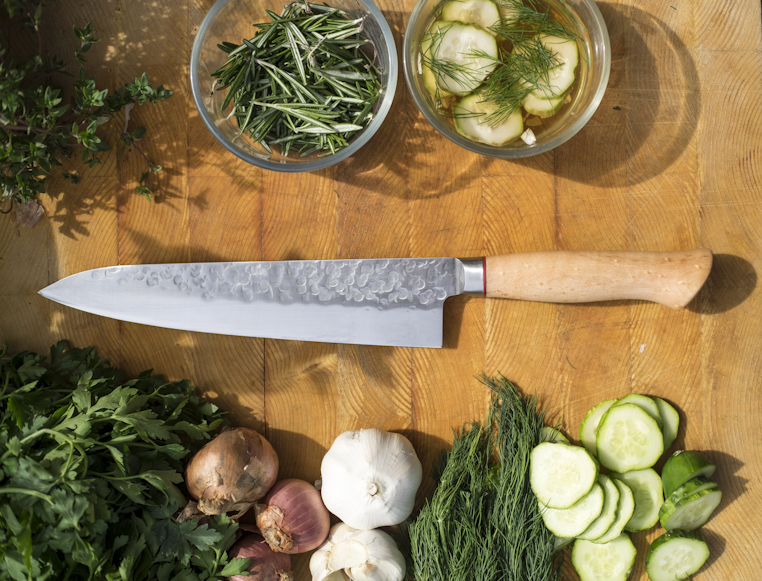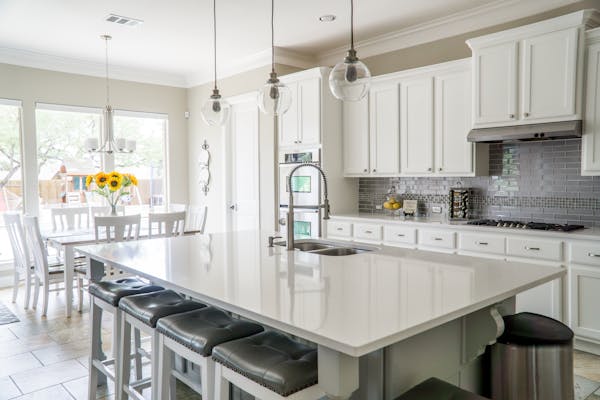In recent years, bamboo has emerged as a sustainable and stylish alternative for various household items, including countertops. Bamboo countertops offer a blend of durability, aesthetics, and environmental friendliness that makes them a compelling choice for homeowners seeking both practicality and elegance in their kitchen or bathroom spaces.
Natural Durability:
Bamboo is renowned for its exceptional durability, making it an ideal material for countertops. Despite its lightweight appearance, bamboo is incredibly strong and robust, capable of withstanding daily use and abuse in busy kitchen environments.
The natural durability of bamboo stems from its unique composition. Bamboo fibers are densely packed, giving the material impressive strength and resilience. This inherent toughness allows bamboo countertops to resist dents, scratches, and other forms of damage that commonly occur in kitchens.
Cleanliness and Longevity:
Furthermore, bamboo possesses natural antimicrobial properties, inhibiting the growth of bacteria and fungi on the countertop surface. This not only contributes to a cleaner and healthier kitchen environment but also helps prolong the lifespan of the countertops by reducing the risk of deterioration from microbial growth.
The natural durability of bamboo countertops provides homeowners with peace of mind, knowing that their kitchen surfaces can withstand the rigors of daily use while maintaining their beauty and functionality for years to come.
Scratch Resistance:
Scratch resistance is a key feature of bamboo countertops, making them highly desirable for kitchen surfaces. Under this subheading, we’ll explore the impressive scratch resistance of that and why it’s advantageous for homeowners.
Bamboo countertops are renowned for their ability to withstand scratches and abrasions, maintaining their smooth and flawless appearance even after years of use. This durability stems from the natural hardness of bamboo fibers, which are tightly packed and resilient to surface damage.
The dense structure of bamboo makes it inherently resistant to scratches caused by everyday kitchen activities, such as cutting food or sliding utensils across the surface. Unlike softer materials like wood or laminate, bamboo countertops are less prone to surface marks and blemishes, ensuring they retain their beauty for longer periods.
Scratch-Resistant Coatings for Lasting Beauty:
Additionally, some bamboo countertops are treated with protective coatings or finishes that further enhance their scratch resistance. These coatings provide an extra layer of defense against scratches and wear, prolonging the lifespan of the countertops and preserving their aesthetic appeal.
For homeowners, the scratch resistance translates to peace of mind and reduced maintenance requirements. With a scratch-resistant surface, homeowners can confidently use their countertops for various tasks without worrying about unsightly marks or damage. This durability ensures that bamboo countertops remain a stylish and functional addition to any kitchen for years to come.
Water Resistance:
Water resistance is a crucial aspect of bamboo countertops, ensuring their durability and longevity in wet environments such as kitchens and bathrooms. In this section, we’ll explore the water resistance of that and their importance for homeowners.
- Natural Moisture Resistance: Bamboo countertops exhibit natural moisture resistance due to the inherent properties of bamboo fibers. The dense and tightly packed structure of bamboo makes it less susceptible to water penetration, reducing the risk of warping, swelling, or damage from moisture exposure.
- Protective Finishes: It is treated with protective finishes or sealants that enhance their water resistance. These finishes create a barrier on the surface of the countertop, repelling water and preventing it from seeping into the bamboo fibers. As a result, spills, splashes, and other forms of water exposure are less likely to cause damage to the countertop.
- Suitability for Wet Areas: The water resistance of bamboo countertops makes them ideal for use in wet areas such as kitchens, bathrooms, and laundry rooms. Unlike traditional materials like wood, which can warp or rot when exposed to moisture, it remains stable and resilient, even in humid environments.
- Easy Cleanup: The water resistance of bamboo countertops simplifies cleanup tasks, as spills and splatters can be easily wiped away without causing damage to the countertop surface. This makes the kitchen a practical choice for busy households where messes are inevitable.
- Long-Term Durability: By maintaining their water resistance over time, bamboo countertops offer long-term durability and performance. Homeowners can enjoy peace of mind knowing that their countertops will remain in excellent condition, even with regular exposure to water and moisture.
Heat Tolerance:
It exhibits impressive heat tolerance, making it a practical and reliable choice for kitchen surfaces. we’ll explore the heat resistance of bamboo countertops and why it’s beneficial for homeowners.
- Natural Thermal Properties: Bamboo possesses natural thermal properties that allow it to withstand high temperatures without warping or damage. This inherent resilience makes bamboo countertops suitable for use near stovetops, ovens, and other heat-emitting appliances in the kitchen.
- Safe Surface for Hot Cookware: Bamboo countertops provide a safe and stable surface for placing hot pots, pans, and dishes directly from the stove or oven. Unlike some materials that may scorch or discolor under heat, bamboo maintains its integrity and appearance even when exposed to high temperatures.
- Protection Against Heat Damage: The dense composition of bamboo fibers acts as a barrier against heat damage, preventing the countertops from becoming scorched or disfigured. This heat resistance ensures that bamboo countertops retain their smooth and pristine finish, even with frequent exposure to heat.
- Versatile Cooking Environment: With heat-tolerant for this, homeowners can create a versatile cooking environment where they can confidently prepare and serve hot meals without worrying about damaging the countertop surface. This versatility enhances the functionality of the kitchen and adds convenience to meal preparation.
Eco-Friendly Material
Bamboo countertops are celebrated as an eco-friendly material choice, offering numerous environmental benefits that appeal to environmentally conscious homeowners. Under this heading, we’ll explore why bamboo is considered a sustainable option for kitchen surfaces.
- Rapid Renewable Resource: Bamboo is a fast-growing grass that regenerates much more quickly than traditional wood species used for countertops. Its rapid growth rate allows bamboo to be harvested sustainably without depleting natural resources or harming the environment.
- Low Environmental Impact: Bamboo cultivation requires minimal water, pesticides, and fertilizers compared to other crops. This results in lower environmental impact and reduced carbon emissions, making bamboo countertops a greener choice for eco-conscious consumers.
- Carbon Sequestration: Bamboo has the remarkable ability to absorb carbon dioxide from the atmosphere and release oxygen during photosynthesis. As a result, bamboo forests act as carbon sinks, helping to mitigate climate change by reducing greenhouse gas emissions.
- Renewable Harvesting Practices: Bamboo can be harvested without causing damage to the plant or surrounding ecosystem. Unlike hardwood trees, which are typically cut down during harvesting, bamboo can be selectively harvested. Allowing the plant to continue growing and contributing to its long-term sustainability.
- Biodegradable and Recyclable: Bamboo countertops are biodegradable at the end of their lifespan, meaning they can be composted or recycled rather than ending up in landfills. This reduces waste and promotes a circular economy where materials are reused or repurposed.
The eco-friendly nature of bamboo countertops makes them an attractive choice for homeowners who prioritize sustainability and environmental stewardship. By opting for bamboo, homeowners can reduce their carbon footprint and contribute to a healthier planet while enjoying stylish and functional kitchen surfaces.
Variety of Styles:
Bamboo countertops offer a diverse range of styles, allowing homeowners to choose the perfect option that complements their kitchen aesthetic.
- Natural Bamboo: Embrace the natural beauty of bamboo with countertops that showcase the unique grain and color variations of this sustainable material. Natural bamboo countertops add warmth and character to any kitchen space, creating a welcoming atmosphere.
- Carbonized Bamboo: For a darker and richer tone, carbonized bamboo countertops are an excellent choice. Through a process of steaming the bamboo, the sugars within the fibers caramelize, resulting in deeper hues ranging from amber to chocolate brown.
- Strand-Woven Bamboo: Known for its durability and strength, strand-woven bamboo countertops feature a distinctive grain pattern that resembles traditional hardwood. These countertops offer a modern and sophisticated look, perfect for contemporary kitchen designs.
- Textured Bamboo: Add visual interest to your kitchen with textured bamboo countertops that feature unique surface treatments such as hand-scraped or distressed finishes. These textures enhance the tactile appeal of the countertops, creating a sense of depth and dimension.
- Stained Bamboo: Customize the color of your countertops with stained bamboo options available in a wide range of shades, from light neutrals to bold hues. Stained bamboo countertops offer versatility and flexibility for coordinating with your kitchen decor.
- Edge Profiles: It comes in various edge profiles, allowing you to choose the perfect edge detail to suit your design preferences. Whether you prefer a classic square edge or a more decorative bullnose edge, there are options available to enhance the overall look of your countertops.
- Finish Options: Explore different finish options for bamboo countertops, including matte, satin, or glossy finishes. Each finish offers a distinct appearance and texture, allowing you to achieve the desired look and feel for your kitchen surfaces.
- Combination Materials: It can also be combined with other materials such as glass, metal, or stone for a unique and custom look. These combination countertops add visual interest and create a focal point in the kitchen.
With such a wide variety of styles to choose from, homeowners can find the perfect bamboo countertops. To elevate their kitchen design and express their style. Whether you prefer the natural beauty of bamboo or a more contemporary look, there’s a style option to suit every taste and preference.
Easy Maintenance
we’ll explore why it is a practical choice for homeowners seeking low-maintenance kitchen surfaces. Here’s a breakdown of why bamboo countertops are easy to care for:
- Simple Cleaning Routine: It requires minimal upkeep, thanks to its smooth and non-porous surface. Regular cleaning with a mild detergent and water is usually sufficient to remove dirt, spills, and stains. Wiping down the countertops with a damp cloth after each use helps prevent buildup and maintains their pristine appearance.
- Stain Resistance: Bamboo is naturally resistant to stains, making it easier to keep countertops looking clean and fresh. Unlike porous materials like marble or granite, bamboo countertops are less susceptible to absorbing liquids and food spills. This reduces the risk of staining and discoloration.
- Avoiding Harsh Chemicals: To preserve the integrity of bamboo countertops, it’s essential to avoid harsh chemicals. And abrasive cleaners that can damage the surface. Instead, opt for gentle, non-abrasive cleaning solutions that are specifically formulated for use on bamboo surfaces. This helps prevent scratching or dulling of the countertops while ensuring they remain in top condition.
- Sealing and Protecting: While it is naturally resistant to moisture and stains, applying a protective sealant can provide an extra layer of defense against wear and tear. Sealants help seal the surface of the bamboo, making it more resistant to water damage. To prolong the lifespan of the countertops. Reapplying sealant periodically, as recommended by the manufacturer, helps maintain the protective barrier and ensures continued durability.
- Preventing Heat Damage: While it is heat-resistant, it’s essential to use trivets or hot pads to protect the surface from direct contact with hot cookware or appliances. This precaution helps prevent potential heat damage and maintains the appearance of the countertops over time.
- Regular Inspections: Periodic inspections of bamboo countertops allow homeowners to identify any signs of wear. Damage early on and address them promptly. Checking for cracks, scratches, or discoloration ensures that any issues are addressed promptly. Preserving the beauty and functionality of the countertops.
The easy maintenance of the kitchen makes them practical. And hassle-free choice for homeowners looking for durable and stylish kitchen surfaces. With proper care and regular upkeep, it can maintain its beauty and functionality. Years to come, enhancing the overall aesthetic and value of the kitchen space.
FAQs
Are bamboo countertops durable?
Yes, It is highly durable and resilient, making it suitable for use in busy kitchen environments. The natural strength of bamboo fibers ensures that countertops can withstand daily wear and tear without easily scratching or denting.
Are bamboo countertops water-resistant?
It has inherent water-resistant properties, but it’s essential to seal them periodically to enhance their resistance to moisture and spills. Proper sealing helps prevent water damage and staining, ensuring the longevity of the countertops.
Are bamboo countertops eco-friendly?
Yes, It is considered eco-friendly because it is a rapidly renewable resource that grows quickly. That regenerates without the need for replanting. Additionally, bamboo cultivation requires fewer pesticides and fertilizers compared to other crops, reducing its environmental impact.
How do I clean and maintain the Kitchen?
Cleaning this is simple. Use a mild detergent and water to wipe down the surface regularly. And avoid harsh chemicals or abrasive cleaners that can damage the bamboo. Periodically reapply a protective sealant to maintain the countertops’ durability and appearance.
Are bamboo countertops heat-resistant?
While it is relatively heat-resistant, it’s essential to use trivets or hot pads to protect the surface from direct contact with hot cookware or appliances. This precaution helps prevent potential heat damage and prolongs the life of the countertops.
Can I install bamboo countertops myself?
Yes, It can typically be installed by homeowners with basic DIY skills. However, for best results, it’s recommended to consult with a professional installer who can ensure proper fitting and installation techniques.
Are there different styles and finishes available for bamboo countertops?
Yes, It comes in a variety of styles, including natural bamboo, carbonized bamboo, and strand-woven bamboo.
How do bamboo countertops compare to other materials like granite or quartz?
It offers unique advantages such as sustainability, natural beauty, and scratch resistance. However, they may not be as heat-resistant or as hard as materials like granite or quartz. The choice between bamboo and other materials depends on personal preferences, budget, and specific needs.




